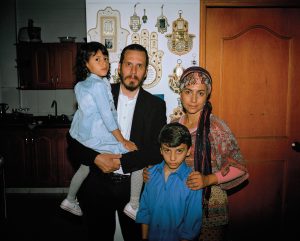Yisro, Pablo Escobar, and A Coming Wave of New Converts

What do modern-day conversion and Yisro have in common? Not so much, according to the people I know. Records kept over many years by the beis din on which I sit (the RCC, in Los Angeles) group candidates according to their motivation. The “spiritual seekers” trail behind those who got interested through their significant other, or are attracted by the life style of genuine Judaism, especially family and community. Yisro, who tried on many forms of religious life before settling on Judaism, would today have to take a number and wait behind people on the conversion line who had been lured by cholent and kugel.
If you guessed that this might be different where religious fervor is part of the general culture, you would be correct – at least anecdotally. Colleagues in Dallas (otherwise known as the buckle of the Bible Belt) report a greater number of applicants who left full-blown involvement with other faiths because they came to reject their assumptions and underpinnings.
While many of these become fervent, model practicing Jews, batei din have learned to exercise caution in regard to this brand of seeker. Some are what might be called “religious tourists,” sampling a new faith long enough to genuinely convince themselves that they believe in it, but tiring of it after a few years, after which they move on to the next religion. Conversion courts try to determine whether the candidates in front of them are really love-struck with Yiddishkeit, or merely in the grips of an infatuation.
Importation from Medellin, Columbia, may change the picture. And we don’t mean cocaine. The remarkable story of the conversion to haredi Judaism of literally hundreds of people there is the subject of media interest over the last years, including a recent riveting account in California Sunday Magazine.
Cocaine actually does contribute to the story. Especially the prevalence of death and despair in Bello, a northern suburb of Medellin that was once the capital of assassins in the employ of Pablo Escobar. That is where the story of the two protagonists starts. It wends its way through fascinating by-ways before its happy conclusion. Along the way we encounter religions gone bad; Israel as a kind of rehab therapy for Central American gang leaders; rejection of the spiritual seekers by the established “uptown” Jews in Medellin (who are Jewish culturally, but not observant, and eventually are upstaged by the converts); supporting roles of the Diaspora Yeshiva and Shavei Yisrael, the Israeli organization that advocates on behalf of dozens of “lost” Jewish communities around the world.
There is more here than another feel-good story.
Millions throughout Latin America have abandoned Catholicism, the faith of their parents. For almost 500 years, the church had maintained a monopoly on their souls. In the 1960s, 90 percent of the population was Catholic. That figure has now dropped to 69 percent. Most of the apostates moved toward evangelicalism, but a smaller, less visible cohort chose Judaism. There are at least 60 communities at different stages of conversion throughout Latin America. Most have come to Judaism without knowing about the others.
The Jews of Bello are the best organized, but they are not the only group that has transitioned from Catholicism to evangelicalism to Judaism. There are at least 60 such communities at different stages of conversion in Mexico, Guatemala, Honduras, Nicaragua, Costa Rica, El Salvador, the Dominican Republic, Venezuela, Ecuador, Peru, Brazil, Chile, and Bolivia. Even in Colombia, Bello is not unique. Thirty similar communities have emerged across the country. Some are just starting; others have been practicing for years.
They have come to Judaism separately, most without knowing about the others. Some converted out of a desire to pursue something original. Some found Judaism during their biblical studies. Others were attracted by the allure of Israel as a world power and the social prestige of Jewish identity as one of economic privilege.
All of these may impact upon the Orthodox world in the future. The trajectory of the geirei tzedek of Bello, however has the most serious implications because it augurs a possible coming wave of modern-day Yisros as the melt-down of traditional institutionalized religions in the West continues. The Jews of Bello began as drop-outs from Catholicism. They then turned to Pentecostalism, which provided them with a deeper sense of personal connection with G-d. (This well-established phenomenon has huge implications for Israel’s security, because Pentecostals, for the most part, are solidly pro-Israel. At least until we lose them, just like we succeeded in losing the new generation of evangelicals.) Encounters with observant Jews got them thinking. Messianic Judaism (sic) was a bridge (a more common phenomenon than most of us know about) between a Christian life-style and observance of Jewish practices – but quickly proved unsatisfactory and oxymoronic. Familiarity with Scripture, coupled with meeting Orthodox Jews who could successfully articulate the ideas of authentic Judaism, helped them embrace Torah not for the sake of convenience, but because they became convinced of its truth.
The story of the Jews of Bello is one of grit and mesiras nefesh, the very stuff of Yisro’s story. As is true of his example, theirs is also one that offers inspiration to all of us.



Fascinating!
Not sure Yitro is the best model though. True he was the first Post-Sinaiatic convert, but he was also the first to drop out.
(I’m expecting you to prove me wrong!)
Very interesting! As a side point, I think this is the first I’m reading of Pablo Escabor and la capital de los sicarios. Do sicarios have a linguistic connection with the Sicarii/ סיקריקון of the Bayis Sheni, or אבא סקרא, relative of Rav Yochanon Ben Zakai?
<Do sicarios have a linguistic connection with the Sicarii/ סיקריקון of the Bayis Sheni?>
Definitely! It’s Latin for “knifemen”!
Very nice.
Only one (minor?) quibble: one doesn’t convert to haredi Judaism, or any other “modified” Judaism. Just Judaism.
(with indirect thanks to CS Lewis)
What’s the cause younger evangelicals no longer support Israel, Rabbi Adlerstein, and who are they supporting?
[YA – This is a topic so big that it deserves several longer pieces. I’ll give you a very brief inventory of reasons that some/many millennial evangelicals no longer support Israel.
1) For over a decade, evangelicals have been wooed by Palestinian Christians who have done a far better and energetic job of it than we have. They have helped create a strong evangelical left, including in previously conservative schools. They have infiltrated the evangelical center, and even the right. All this has softened the evangelical position on Israel.
2) There has been a down side to the wonderful support we have seen from the John Hagee and CUFI people, bless them. They come from a theological position so detested by the majority of evangelicals, that some of them have argued that if the John Hagee types are Christian Zionists, then we ought to be Christian anti-Zionists. The pro-Israel position has been caught in a turf war between competing theological positions in the evangelical world
3) Evangelical schools are still run like colleges. The leftist-leanings of the American academy may not be as loony in church schools, but they have been hurt by contagion enough for some of the thought to seep in. That means turning the poor and oppressed into saints, regardless of history, context, or culpability
4) The most important reason: (DRUM ROLL) There is always some white space between generations. Millennials, possibly responding to the general poisoned waters of general culture, just do not respond to Scripture the same way that their parents did. And it is Scripture that makes so many Christians – even the sizeable minority in denominations generally hostile to Israel- kvell when they visit Israel or ponder the Biblical dimensions of its establishment and success.]
Thanks, but what makes them Haredi? As far as I can tell, there’s no rejection of Zionism or secular studies, the two basic issues over which Haredi Judaism differs from ordinary Orthodox Judaism.
[YA – Possibly, but not likely. When people convert, they most often take on the practices and attitudes of the community that nurtured them spiritually. (Sometime, too much so!) From their teachers and dress, we would guess that it is far more likely that they picked up a more typical approach than that they will be guest contributing to Cross-Currents (Spanish edition) in the near future.]
i disagree with part of the contention —-
Pentecostals, for the most part, are solidly pro-Israel. At least until we lose them, just like we succeeded in losing the new generation of evangelicals.
—-not the fact that the younger evangelicals are more likely to be pro-palestine than their parents , for it is a fact -across all religions and political persuations in this country–that the support for the israeli claim drops dramatically in millenials. i disagree that it’s something we did . i just don’t think that there is hasbara that will be acceptable to change facts on the ground ie there was a Nakba , there was further occupation in 1967 , that it is the longest lasting still existing occupation etc etc . If one is expected to behave by Western Democracy rules , there is NO answer that israel can give that justifies ruling over non-voting people , or in any way having a society based on religion rather than democratic principles. if not for assumptions of promises by the RBSO , i would not be optimistic for the prospect of sustained endurance of a ‘zionist entity’ as currently constructed . [ and the RBSO never gave any promises about anything ‘secular’ in His land . In chu’l we just read the promise to expel the jewish residents of that area for moral depravity….]
I just want to pint out that 2 of the Rabbis who visited Bello and who trained the current Rabbi of theKehilla were from the Yeshivah on Har Tzion, Toras Yisroel (sometimes referred to as Diaspora Yeshiva) The Rosh yeshiva, Harav Goldstein, anlong with his Rebbetzin, his children, the Ramim and the long term avreichim have worked miracles for Am Yisrael, and especially for Baalei Teshuvah from Hutz Laaretz. They are true pioneers of Torah who seldom get the Hakaras Hatov they deserve and run on a shoe string budget from year to year. Frankly, if all the rest of us were not so wrapped up in our various institutionalized identities we would see where the credit should go. Kol Hakavod to this little under-recognized yeshiva for encouraging this wave of determined Geiri Tzedek. The extent of the transformation they may cause in incalculablr.